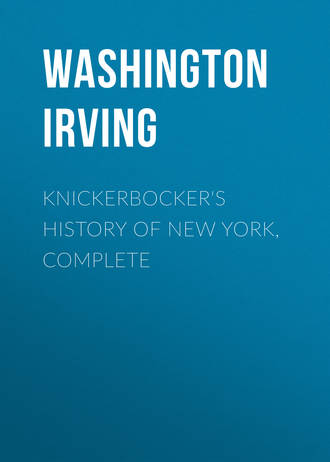
Вашингтон Ирвинг
Knickerbocker's History of New York, Complete
CHAPTER III
In the last two chapters I have regaled the reader with a delectable picture of the good Peter and his metropolis during an interval of peace. It was, however, but a bit of blue sky in a stormy day; the clouds are again gathering up from all points of the compass, and, if I am not mistaken in my forebodings, we shall have rattling weather in the ensuing chapters.
It is with some communities, as it is with certain meddlesome individuals – they have a wonderful facility at getting into scrapes; and I have always remarked that those are most prone to get in who have the least talent at getting out again. This is doubtless owing to the excessive valor of those states; for I have likewise noticed that this rampant quality is always most frothy and fussy where most confined; which accounts for its vaporing so amazingly in little states, little men and ugly little women more especially.
Such is the case with this little province of the Nieuw Nederlands; which, by its exceeding valor, has already drawn upon itself a host of enemies; has had fighting enough to satisfy a province twice its size, and is in a fair way of becoming an exceedingly forlorn, well-belabored, and woebegone little province. All which was providentially ordered to give interest and sublimity to this pathetic history.
The first interruption to the halcyon quiet of Peter Stuyvesant was caused by hostile intelligence from the old belligerent nest of Rensellaersteen. Killian, the lordly patroon of Rensellaerwick, was again in the field, at the head of his myrmidons of the Helderberg seeking to annex the whole of the Catskill mountains to his domains. The Indian tribes of these mountains had likewise taken up the hatchet, and menaced the venerable Dutch settlements of Esopus.
Fain would I entertain the reader with the triumphant campaign of Peter Stuyvesant in the haunted regions of those mountains, but that I hold all Indian conflicts to be mere barbaric brawls, unworthy of the pen which has recorded the classic war of Fort Christina; and as to these Helderberg commotions, they are among the flatulencies which from time to time afflict the bowels of this ancient province, as with a wind-colic, and which I deem it seemly and decent to pass over in silence.
The next storm of trouble was from the south. Scarcely had the worthy Mynheer Beekman got warm in the seat of authority on the South River, than enemies began to spring up all around him. Hard by was a formidable race of savages inhabiting the gentle region watered by the Susquehanna, of whom the following mention is made by Master Hariot in his excellent history: —
"The Susquesahanocks are a giantly people, strange in proportion, behavior, and attire – their voice sounding from them as out of a cave. Their tobacco-pipes were three-quarters of a yard long; carved at the great end with a bird, beare, or other device, sufficient to beat out the brains of a horse. The calfe of one of their legges measured three-quarters of a yard about; the rest of the limbs proportionable."57
These gigantic savages and smokers caused no little disquiet in the mind of Mynheer Beekman, threatening to cause a famine of tobacco in the land; but his most formidable enemy was the roaring, roistering English colony of Maryland, or, as it was anciently written, Merryland; so called because the inhabitants, not having the fear of the Lord before their eyes, were prone to make merry and get fuddled with mint-julep and apple-toddy. They were, moreover, great horse-racers and cock-fighters, mighty wrestlers and jumpers, and enormous consumers of hoe-cake and bacon. They lay claim to be the first inventors of those recondite beverages, cock-tail, stone-fence, and sherry-cobbler, and to have discovered the gastronomical merits of terrapins, soft crabs, and canvas-back ducks.
This rantipole colony, founded by Lord Baltimore, a British nobleman, was managed by his agent, a swaggering Englishman, commonly called Fendall, that is to say, "offend all," a name given him for his bullying propensities. These were seen in a message to Mynheer Beekman, threatening him, unless he immediately swore allegiance to Lord Baltimore as the rightful lord of the soil, to come at the head of the roaring boys of Merryland and the giants of the Susquehanna, and sweep him and his Nederlanders out of the country.
The trusty sword of Peter Stuyvesant almost leaped from its scabbard, when he received missives from Mynheer Beekman, informing him of the swaggering menaces of the bully Fendall; and as to the giantly warriors of the Susquehanna, nothing would have more delighted him than a bout, hand to hand, with half a score of them, having never encountered a giant in the whole course of his campaigns, unless we may consider the stout Risingh as such, and he was but a little one.
Nothing prevented his marching instantly to the South River, and enacting scenes still more glorious than those of Fort Christina, but the necessity of first putting a stop to the increasing aggressions and inroads of the Yankees, so as not to leave an enemy in his rear; but he wrote to Mynheer Beekman to keep up a bold front and a stout heart, promising, as soon as he had settled affairs in the east, that he would hasten to the south with his burly warriors of the Hudson, to lower the crests of the giants, and mar the merriment of the Merrylanders.
CHAPTER IV
To explain the apparently sudden movement of Peter Stuyvesant against the crafty men of the East Country, I would observe that, during his campaigns on the South River, and in the enchanted regions of the Catskill Mountains, the twelve tribes of the East had been more than usually active in prosecuting their subtle scheme for the subjugation of the Nieuw Nederlands.
Independent of the incessant maraudings among hen-roosts and squattings along the border, invading armies would penetrate, from time to time, into the very heart of the country. As their prototypes of yore went forth into the land of Canaan, with their wives and their children, their men-servants and their maid-servants, their flocks and herds, to settle themselves down in the land and possess it; so these chosen people of modern days would progress through the country in patriarchal style, conducting carts and waggons laden with household furniture, with women and children piled on top, and pots and kettles dangling beneath. At the tail of these vehicles would stalk a crew of long-limbed, lank-sided varlets with axes on their shoulders, and packs on their backs, resolutely bent upon "locating" themselves, as they termed it, and improving the country. These were the most dangerous kind of invaders. It is true they were guilty of no overt acts of hostility; but it was notorious that, wherever they got a footing, the honest Dutchmen gradually disappeared, retiring slowly as do the Indians before the white men; being in some way or other talked and chaffered, and bargained and swapped, and, in plain English, elbowed out of all those rich bottoms and fertile nooks in which our Dutch yeomanry are prone to nestle themselves.
Peter Stuyvesant was at length roused to this kind of war in disguise, by which the Yankees were craftily aiming to subjugate his dominions.
He was a man easily taken in, it is true, as all great-hearted men are apt to be; but if he once found it out, his wrath was terrible. He now threw diplomacy to the dogs, determined to appear no more by ambassadors, but to repair in person to the great council of the Amphictyons, bearing the sword in one hand and the olive-branch in the other, and giving them their choice of sincere and honest peace, or open and iron war.
His privy council were astonished and dismayed when he announced his determination. For once they ventured to remonstrate, setting forth the rashness of venturing his sacred person in the midst of a strange and barbarous people. They might as well have tried to turn a rusty weathercock with a broken-winded bellows. In the fiery heart of the iron-headed Peter sat enthroned the five kinds of courage described by Aristotle, and had the philosopher enumerated five hundred more, I verily believed he would have possessed them all. As to that better part of valor called discretion, it was too cold-blooded a virtue for his tropical temperament.
Summoning, therefore, to his presence his trusty follower, Antony Van Corlear, he commanded him to hold himself in readiness to accompany him the following morning on this his hazardous enterprise.
Now Antony the Trumpeter was by this time a little stricken in years, yet by dint of keeping up a good heart, and having never known care or sorrow (having never been married), he was still a hearty, jocund, rubicund, gamesome wag, and of great capacity in the doublet. This last was ascribed to his living a jolly life on those domains at the Hook, which Peter Stuyvesant had granted to him for his gallantry at Fort Casimir.
Be this as it may, there was nothing that more delighted Antony than this command of the great Peter, for he could have followed the stout-hearted old governor to the world's end, with love and loyalty – and he moreover still remembered the frolicing, and dancing, and bundling, and other disports of the east country, and entertained dainty recollections of numerous kind and buxom lasses, whom he longed exceedingly again to encounter.
Thus then did this mirror of hardihood set forth, with no other attendant but his trumpeter, upon one of the most perilous enterprises ever recorded in the annals of knight-errantry. For a single warrior to venture openly among a whole nation of foes – but, above all, for a plain, downright Dutchman to think of negotiating with the whole council of New England! – never was there known a more desperate undertaking! Ever since I have entered upon the chronicles of this peerless, but hitherto uncelebrated, chieftain, has he kept me in a state of incessant action and anxiety with the toils and dangers he is constantly encountering. Oh, for a chapter of the tranquil reign of Wouter Van Twiller, that I might repose on it as on a feather-bed!
Is it not enough, Peter Stuyvesant, that I have once already rescued thee from the machinations of these terrible Amphictyons, by bringing the powers of witchcraft to thine aid? Is it not enough that I have followed thee undaunted, like a guardian spirit, into the midst of the horrid battle of Fort Christina? That I have been put incessantly to my trumps to keep them safe and sound – now warding off with my single pen the shower of dastard blows that fell upon thy rear – now narrowly shielding thee from a deadly thrust by a mere tobacco-box – now casing thy dauntless skull with adamant, when even thy stubborn ram beaver failed to resist the sword of the stout Risingh – and now, not merely bringing thee off alive, but triumphant, from the clutches of the gigantic Swede, by the desperate means of a paltry stone pottle? Is not all this enough, but must thou still be plunging into new difficulties, and hazarding in headlong enterprises thyself, thy trumpeter, and thy historian?
And now the ruddy-faced Aurora, like a buxom chambermaid, draws aside the sable curtains of the night, and out bounces from his bed the jolly red-haired Phoebus, startled at being caught so late in the embraces of Dame Thetis. With many a stable-boy oath he harnesses his brazen-footed steeds, and whips, and lashes, and splashes up the firmament, like a loitering coachman, half-an-hour behind his time. And now behold that imp of fame and prowess, the headstrong Peter, bestriding a raw-boned, switch-tailed charger, gallantly arrayed in full regimentals, and bracing on his thigh that trusty, brass-hilted sword, which had wrought such fearful deeds on the banks of the Delaware.
Behold hard after him his doughty trumpeter, Van Corlear, mounted on a broken-winded, walleyed, calico mare; his stone pottle, which had laid low the mighty Risingh, slung under his arm; and his trumpet displayed vauntingly in his right hand, decorated with a gorgeous banner, on which is emblazoned the great beaver of the Manhattoes. See them proudly issuing out of the city gate, like an iron clad hero of yore, with his faithful squire at his heels; the populace following with their eyes, and shouting many a parting wish and hearty cheering, Farewell, Hardkoppig Piet! Farewell, honest Antony! pleasant be your wayfaring, prosperous your return! – the stoutest hero that ever drew a sword, and the worthiest trumpeter that ever trod shoe-leather!
Legends are lamentably silent about the events that befell our adventurers in this their adventurous travel, excepting the Stuyvesant manuscript, which gives the substance of a pleasant little heroic poem, written on the occasion by Dominie Ægidius Luyck,58 who appears to have been the poet laureate of New Amsterdam. This inestimable manuscript assures us that it was a rare spectacle to behold the great Peter and his loyal follower hailing the morning sun, and rejoicing in the clear countenance of Nature, as they pranced it through the pastoral scenes of Bloemen Dael; which in those days was a sweet and rural valley, beautiful with many a bright wild flower, refreshed by many a pure streamlet, and enlivened here and there by a delectable little Dutch cottage, sheltered under some sloping hill, and almost buried in embowering trees.
Now did they enter upon the confines of Connecticut, where they encountered many grievous difficulties and perils. At one place they were assailed by a troop of country squires and militia colonels, who, mounted on goodly steeds, hung upon their rear for several miles, harassing them exceedingly with guesses and questions, more especially the worthy Peter, whose silver-chased leg excited not a little marvel. At another place, hard by the renowned town of Stamford, they were set upon by a great and mighty legion of church deacons, who imperiously demanded of them five shillings for traveling on Sunday, and threatened to carry them captive to a neighboring church, whose steeple peered above the trees; but these the valiant Peter put to rout with little difficulty, insomuch that they bestrode their canes and galloped off in horrible confusion, leaving their cocked hats behind in the hurry of their flight. But not so easily did he escape from the hands of a crafty man of Pyquag; who, with undaunted perseverance and repeated onsets, fairly bargained him out of his goodly switch-tailed charger, leaving in place thereof a villainous, foundered Narraganset pacer.
But, maugre all these hardships, they pursued their journey cheerily along the course of the soft flowing Connecticut, whose gentle waves, says the song, roll through many a fertile vale and sunny plain; now reflecting the lofty spires of the bustling city, and now the rural beauties of the humble hamlet; now echoing with the busy hum of commerce, and now with the cheerful song of the peasant.
At every town would Peter Stuyvesant, who was noted for warlike punctilio, order the sturdy Antony to sound a courteous salutation; though the manuscript observes that the inhabitants were thrown into great dismay when they heard of his approach. For the fame of his incomparable achievements on the Delaware had spread throughout the east country, and they dreaded lest he had come to take vengeance on their manifold transgressions.
But the good Peter rode through these towns with a smiling aspect, waving his hand with inexpressible majesty and condescension; for he verily believed that the old clothes which these ingenious people had thrust into their broken windows, and the festoons of dried apples and peaches which ornamented the fronts of their houses, were so many decorations in honor of his approach, as it was the custom in the days of chivalry to compliment renowned heroes by sumptuous displays of tapestry and gorgeous furniture. The women crowded to the doors to gaze upon him as he passed, so much does prowess in arms delight the gentler sex. The little children, too, ran after him in troops, staring with wonder at his regimentals, his brimstone breeches, and the silver garniture of his wooden leg. Nor must I omit to mention the joy which many strapping wenches betrayed at beholding the jovial Van Corlear, who had whilom delighted them so much with his trumpet, when he bore the great Peter's challenge to the Amphictyons. The kind-hearted Antony alighted from his calico mare, and kissed them all with infinite loving kindness, and was right pleased to see a crew of little trumpeters crowding round him for his blessing, each of whom he patted on the head, bade him be a good boy, and gave him a penny to buy molasses candy.
CHAPTER V
Now so it happened, that while the great and good Peter Stuyvesant, followed by his trusty squire, was making his chivalric progress through the east country, a dark and direful scheme of war against his beloved province was forming in that nursery of monstrous projects, the British Cabinet.
This, we are confidently informed, was the result of the secret instigations of the great council of the league; who, finding themselves totally incompetent to vie in arms with the heavy-sterned warriors of the Manhattoes and their iron-headed commander, sent emissaries to the British Government, setting forth in eloquent language the wonders and delights of this delicious little Dutch Canaan, and imploring that a force might be sent out to invade it by sea, while they should co-operate by land.
These emissaries arrived at a critical juncture, just as the British Lion was beginning to bristle up his mane and wag his tail; for we are assured by the anonymous writer of the Stuyvesant manuscript that the astounding victory of Peter Stuyvesant at Fort Christina had resounded throughout Europe, and his annexation of the territory of New Sweden had awakened the jealousy of the British Cabinet for their wild lands at the south. This jealousy was brought to a head by the representations of Lord Baltimore, who declared that the territory thus annexed lay within the lands granted to him by the British Crown, and he claimed to be protected in his rights. Lord Sterling, another British subject, claimed the whole of Nassau, or Lond Island, once the Ophir of William the Testy, but now the kitchen-garden of the Manhattoes, which he declared to be British territory by the right of discovery, but unjustly usurped by the Nederlanders.
The result of all these rumors and representations was a sudden zeal on the part of his Majesty Charles the Second for the safety and well-being of his transatlantic possessions, and especially for the recovery of the New Netherlands, which Yankee logic had, somehow or other, proved to be a continuity of the territory taken possession of for the British Crown by the pilgrims when they landed on Plymouth Rock, fugitives from British oppression. All this goodly land thus wrongfully held by the Dutchmen, he presented, in a fit of affection, to his brother the Duke of York, a donation truly royal, since none but great sovereigns have a right to give away what does not belong to them. That this munificent gift might not be merely nominal, his Majesty ordered that an armament should be straightway despatched to invade the city of New Amsterdam by land and water, and put his brother in complete possession of the premises.
Thus critically situated are the affairs of the New Nederlanders. While the honest burghers are smoking their pipes in somber security, and the privy councillors are snoring in the council chamber, while Peter the Headstrong is undauntedly making his way through the east country, in the confident hope by honest words and manly deeds to bring the grand council to terms, a hostile fleet is sweeping like a thunder-cloud across the Atlantic, soon to rattle a storm of war about the ears of the dozing Nederlanders, and to put the mettle of their governor to the trial.
But come what may, I here pledge my veracity that in all warlike conflicts and doubtful perplexities he will every acquit himself like a gallant, noble-minded, obstinate old cavalier. Forward, then, to the charge! Shine out, propitious stars, on the renowned city of the Manhattoes; and the blessing of St. Nicholas go with thee, honest Peter Stuyvesant.







